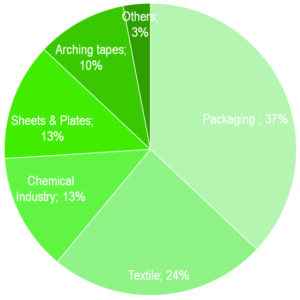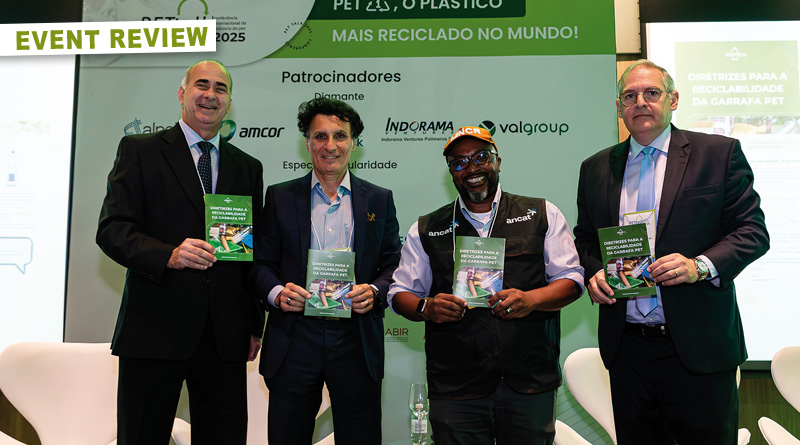Brazil recycled 410,000 t of PET packaging in 2024
Unprecedented memorandum will encourage the recyclability of packaging based on the “design for environment” principles
Photo top: F.l.t.r.: Auri Marçon of ABIPET, Andre M. Nassar of ABIOVE, Roberto Rocha of ANCAT and Alexandre Horta of ABIR
The Census also shows that the PET recycling industry has remained solid, with sales of around R$ 5,66 billion (US $996 million), or 32% of all sales in the sector, representing strong income generation for the base of the social pyramid: approximately 40% of this total remains with waste pickers, cooperatives and recyclables dealers.
The volume of recycling and the turnover are the result of investments in installed capacity and the development of demand for recycled material, based on work carried out by industry for at least three decades. However, the sector is facing a challenge. The lack of a consistent public policy on selective collection is preventing packaging discarded by consumers from being properly disposed of.
“Recycling companies are operating at an average idle capacity rate of 23%, with peaks of up to 40%,” says Auri Marçon, executive president of ABIPET. “As a result, the PET recycling industry is reaching its limits, as it doesn’t have the raw materials it needs for its production processes, while tons of packaging are destined for ordinary landfills or are incorrectly disposed of in the environment.”
Circularity on the rise: from one bottle to another
PET packaging also continues to intensify its image of great circularity. In 2024, the main destination for recycled resin – 37% of the total – was the manufacture of new packaging (preforms and bottles), used mainly by the water, soft drinks, energy drinks and other non-alcoholic beverages industry, within the food-grade bottle-to-bottle system. In the last survey, this market segment had already taken the lead, with an index of 29%.

“This growth is due to demand from large users of PET packaging, who trust in the qualities and characteristics of the material and have maintained their commitment to sustainability, even at a time when recycled resin is being sold at a higher price than virgin product,” says ABIPET’s executive president.
The textile sector comes in second place among the biggest users, with a consumption of 24% of all recycled material, followed by the chemical industry (13%), sheets & plates (13%), arching tapes (10%) and other applications which account for 3% of the total.
Design for recycling and the environment
An unprecedented memorandum signed will also seek to encourage the development of PET packaging with a high value for recycling, within the principle of “design for environment”, expanding the circularity of the product, generating income for the base of the social pyramid. ABIPET itself, the Brazilian Association of the Soft Drinks and Non-Alcoholic Beverages Industry (ABIR), the Brazilian Association of the Vegetable Oil Industry (ABIOVE) and the National Association of Waste Pickers (ANCAT) are participating in this agreement.
ABIPET updated the Guidelines for the Recyclability of PET Packaging, with the support of the other business entities, which will also be responsible for disseminating them and raising awareness among their members. The action seeks to prevent the development and production of poorly designed packaging, which is not used by waste pickers and recyclers and ends up becoming waste that is sent to ordinary landfills.
ANCAT will collaborate by identifying, together with its member cooperatives, which are packaging that is less attractive for recycling – and their respective brands – so that solutions can be found to facilitate recycling.
“We know that the recyclability of packaging starts with its design, since the characteristics of the body, label and cap directly influence post-consumer reuse. The launch of the new edition of the Guidelines aims to collaborate and alert professionals involved in this phase of the process to the consequences of their choices, even before the packaging reaches the market,” says ABIPET’s executive president, Auri Marçon.
Scientific light in the sustainability debate
The Census of PET Recycling in Brazil and the relaunch of the Guidelines for the Recyclability of PET Packaging are part of a wide-ranging effort by ABIPET to shed scientific light on the discussion of circularity, sustainability and the environmental impact of packaging.
In this regard, the Association had already made available to the market the PET Life Cycle Assessment (PET LCA) study (see PETplanet 3/25), launched at the end of 2024, which shows the environmental advantage of PET over glass, aluminium and steel packaging. For the first time in Brazil, work like this was carried out based on a Life Cycle Inventory, taking into account primary data from the entire production chain in Brazil.
It also relied on extensive external technical and scientific validation from the Packaging Technology Center of the Institute of Food Technology (ITAL/CETEA), linked to the São Paulo State Department of Agriculture and Supply, as well as the active participation of ABIR and ABIOVE, in addition to important contributions from companies in these sectors.
The data was also subjected to critical review by experts from major Brazilian universities, to ensure that the results for the comparative statements comply with the quality requirements of the ABNT NBR ISSO 14040:2009 and ABNT NBR ISSO 14044:2006 standards.
International conference in São Paulo
The announcements made by ABIPET were made during the 2025 edition of PETtalk – International Conference of the PET Industry, which on March 24 brough together the most important companies in the PET packaging market, from Brazil and around the world, and some of their most important executives and specialists. The event features market information and lectures focused on innovation, sustainability, trends and news in the sector.
PETtalk is internationally recognised as a space for the exchange of up-to-date information and the presentation of the most modern technologies applied by the sector. This edition also features the participation of international associations – the North American NAPCOR and the European Petcore – which provided an insight into the PET packaging market in the United States, Canada, Mexico and the European Community.
PETtalk is sponsored by the largest global companies in the sector – Alpek, Amcor, Engepack, Indorama Ventures, Valgroup, Cirklo, Husky, Krones and Polymetrix – as well as by Coca-Cola, one of the largest users of PET packaging for its products, with important projects linked to recycling and ESG practices. The event also has the institutional support of the sector’s main representative bodies.

